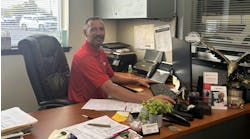MASTERING MANAGEMENTAvoid Common Scams
That Can Wreck Your ShopLearn from the lessons of other shop owners and keep thieves away from your money. In this industry, we all work far too hard to give up any hard-earned profits to scam artists. That's why I find it particularly discouraging to hear about a shop owner falling prey to a scheme that could end up costing several thousands of dollars. When any of us get stung - or even nearly stung - by one of these scams, one of the best things we can do is share that information with others. Often there are some simple things we can do to protect ourselves, but we may not think to take those steps until it's clear why we should. So in talking with shop owners around the country in recent months, here are some of the scams that they've encountered, and some tips on how to avoid becoming a victim. Fake money orders and cashier's checks One shop owner said an employee at one of his two locations accepted two money orders totaling nearly $2,000 from a customer for repair of a vehicle. The employee was under the impression that all money orders have to be good because you have to pay cash for them. Several days later, however, the shop's bank returned the money orders as invalid. By calling the phone number for the business where the money orders were supposedly issued, the shop learned they were counterfeit. He said the fraud could have been avoided if they'd done a better job of verifying the identification of the customer and matching it to the money order and vehicle registration. Between the fake names, addresses, signatures and phone numbers given by the customer and on the money order, something should have raised a red flag, he said. Their shop's managers now knows that any type of check or money order needs to be validated before a vehicle is released. Fake cashier's checks also have been used in scams. So if something doesn't seem right, ask the customer for cash, driving the customer to the bank, if necessary. Phony invoices Probably anyone in business for any length of time has received invoices for goods or services the business never ordered or received. This seems to be the primary means of marketing for some phone directories, for example. But one shop I heard about also received a multipage credit application along with a phony invoice from a "data equipment company." Even filling out that application and sending it back would give the scammer information that can be just as valuable as a check. Make sure your employees know not to fill out any credit applications without checking that the company requesting the information really is one with which the shop plans to do business. Bedliner scams This one has gotten lots of press, but it bears repeating. A bedliner company calls, saying they will do the marketing and send the shop referrals for their area. The shop is then told that a referral has come in for a fleet of trucks that will require the shop to pre-purchase a large order of material to perform the pre-scheduled work on a "rush" basis. The fleet never shows up, and the pre-purchased material is not usable or returnable. 'Custody and control' A mechanical shop owner in my state said one of his customers recently refused to pay more than $800 of a repair bill totaling more than $2,000, and because the customer parked the car on the street rather than on shop property after the test drive, the police told the shop owner he couldn't prevent the customer from leaving with the vehicle. "I've learned that the vehicle should never leave your possession," the shop owner said. "You do the driving if the customer wants a road test. You bring the car back on your lot. Do not let the customer [drive] the vehicle until it's paid for." In-house problems Of course, not all scam artists steal from outside your business. One shop owner learned his manager had stolen hundreds of thousands of dollars from the business over the course of five years. The employee was keeping payments made in cash instead of depositing them in the shop's bank account. He also added the shop's name to his personal bank account so that he could deposit business checks into his own account. To prevent similar problems in the future, the shop implemented a "checks-and-balances" system in which every job and estimated repair cost is logged in when it enters the shop and before it is entered in the accounting system. At the end of every month, the shop owner receives a file with all of the month's work. He makes sure the figures from the shop and from the office match up. Another shop's bookkeeper inflated her paycheck by an average of $1,000 per month for a year, accounting for changes in financial records by altering the amount shown as paid to shop suppliers. Shops can prevent such situations by limiting check-signing authority, comparing accounts payable checks to vendor statements, reviewing canceled checks and not allowing the person handling receivables to also oversee deposits. There's no way to protect yourself 100 percent from a determined scam artist, but you can at least make sure they have to work at least as hard as you do to get at any of your money.
That Can Wreck Your ShopLearn from the lessons of other shop owners and keep thieves away from your money. In this industry, we all work far too hard to give up any hard-earned profits to scam artists. That's why I find it particularly discouraging to hear about a shop owner falling prey to a scheme that could end up costing several thousands of dollars. When any of us get stung - or even nearly stung - by one of these scams, one of the best things we can do is share that information with others. Often there are some simple things we can do to protect ourselves, but we may not think to take those steps until it's clear why we should. So in talking with shop owners around the country in recent months, here are some of the scams that they've encountered, and some tips on how to avoid becoming a victim. Fake money orders and cashier's checks One shop owner said an employee at one of his two locations accepted two money orders totaling nearly $2,000 from a customer for repair of a vehicle. The employee was under the impression that all money orders have to be good because you have to pay cash for them. Several days later, however, the shop's bank returned the money orders as invalid. By calling the phone number for the business where the money orders were supposedly issued, the shop learned they were counterfeit. He said the fraud could have been avoided if they'd done a better job of verifying the identification of the customer and matching it to the money order and vehicle registration. Between the fake names, addresses, signatures and phone numbers given by the customer and on the money order, something should have raised a red flag, he said. Their shop's managers now knows that any type of check or money order needs to be validated before a vehicle is released. Fake cashier's checks also have been used in scams. So if something doesn't seem right, ask the customer for cash, driving the customer to the bank, if necessary. Phony invoices Probably anyone in business for any length of time has received invoices for goods or services the business never ordered or received. This seems to be the primary means of marketing for some phone directories, for example. But one shop I heard about also received a multipage credit application along with a phony invoice from a "data equipment company." Even filling out that application and sending it back would give the scammer information that can be just as valuable as a check. Make sure your employees know not to fill out any credit applications without checking that the company requesting the information really is one with which the shop plans to do business. Bedliner scams This one has gotten lots of press, but it bears repeating. A bedliner company calls, saying they will do the marketing and send the shop referrals for their area. The shop is then told that a referral has come in for a fleet of trucks that will require the shop to pre-purchase a large order of material to perform the pre-scheduled work on a "rush" basis. The fleet never shows up, and the pre-purchased material is not usable or returnable. 'Custody and control' A mechanical shop owner in my state said one of his customers recently refused to pay more than $800 of a repair bill totaling more than $2,000, and because the customer parked the car on the street rather than on shop property after the test drive, the police told the shop owner he couldn't prevent the customer from leaving with the vehicle. "I've learned that the vehicle should never leave your possession," the shop owner said. "You do the driving if the customer wants a road test. You bring the car back on your lot. Do not let the customer [drive] the vehicle until it's paid for." In-house problems Of course, not all scam artists steal from outside your business. One shop owner learned his manager had stolen hundreds of thousands of dollars from the business over the course of five years. The employee was keeping payments made in cash instead of depositing them in the shop's bank account. He also added the shop's name to his personal bank account so that he could deposit business checks into his own account. To prevent similar problems in the future, the shop implemented a "checks-and-balances" system in which every job and estimated repair cost is logged in when it enters the shop and before it is entered in the accounting system. At the end of every month, the shop owner receives a file with all of the month's work. He makes sure the figures from the shop and from the office match up. Another shop's bookkeeper inflated her paycheck by an average of $1,000 per month for a year, accounting for changes in financial records by altering the amount shown as paid to shop suppliers. Shops can prevent such situations by limiting check-signing authority, comparing accounts payable checks to vendor statements, reviewing canceled checks and not allowing the person handling receivables to also oversee deposits. There's no way to protect yourself 100 percent from a determined scam artist, but you can at least make sure they have to work at least as hard as you do to get at any of your money.




